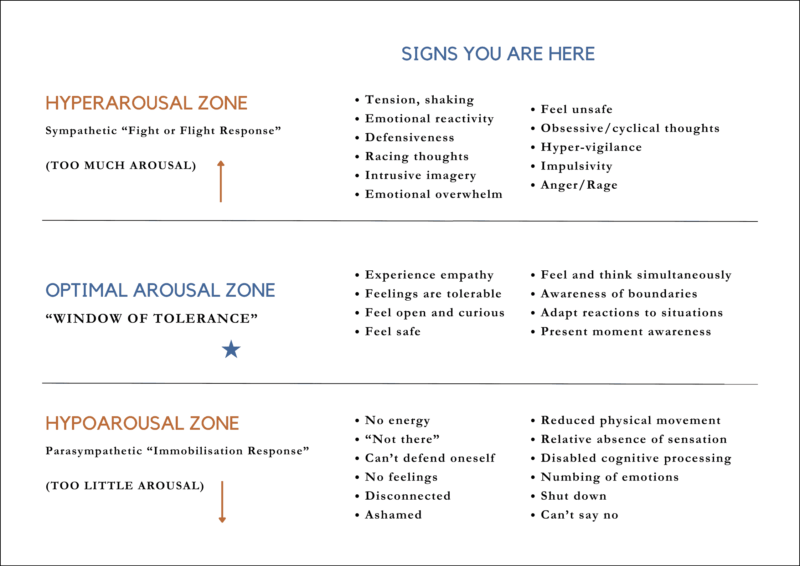
DESCRIPTION: AN ARTICLE THAT EXPLAINS WHAT TRAUMA IS AND WHY TRAUMA-INFORMED THERAPY IS REQUIRED
Conventional interventions against sexual violence focus significantly on after-the-fact intervention. At Indian universities, this may look like one workshop to identify harassment, another to identify places to report harassment, and yet another to seek help. When primary institutions and communities work in this post-facto cycle, they propagate the idea that sexual harassment is inevitable and that the onus of identifying and coping with it is on the survivor-victim. Furthermore, when the only process of seeking help delimits the definition of justice for the survivor-victim by prioritising institutional retribution, communities continue to fail at making room for individual recovery and collective restoration–there exists no wellness in justice.
Such justice (where survivor-victims are mere observers in their fate and offenders are solely defenders of their narrative) neglects to acknowledge that all cases of sexual harm are at their core, also cases of trauma. We then need holistic practices that gauge the level of wellness and restore the complete physical, mental, and social well-being of survivor-victims to prevent further harm.
One such practice is that of trauma-informed therapy. A trauma-informed mental health practitioner offers services, tools, and resources that help survivor-victims to locate and navigate their body’s responses to experiences of sexual harm. While goals for individuals may differ, it simply comes down to empowering them with a new-found understanding of safety and continuity; one that is devoid of shame and isolation.
What Does Trauma Look Like?
To better understand the need for trauma-informed therapy, it is first important to understand how trauma manifests. Trauma is not the experience of violence, it is the experience of an individual’s prolonged response to violence. It is an emotional, physical, and cognitive response that affects one’s ability to regulate their emotions and responses on a day-to-day basis.
Trauma from sexual harm, in particular, can be linked to both short-term and long-term impacts on survivor-victims. From initial shock and confusion, guilt, somatic symptoms, and perceived lack of control and trust to long-term implications like post-traumatic stress, suicidality, dissociation, and interpersonal difficulties, trauma can manifest in multiple ways.
Our mainstream understanding of trauma is often one that looks at visible manifestations of violence—the kind that is known, manifests in the physical, and is often severe. Understanding sexual violence and associated trauma is, however, more nuanced than that. In 1999, Dr. Dan Siegal coined the concept of, “The Window of Tolerance.” His idea is useful to illustrate how any trauma may disrupt the daily.

The optimal zone of arousal is one where an individual can handle stressors without feeling overwhelmed or distressed. Traumatic experiences can disrupt this window of tolerance. Survivor-victims may find themselves frequently shifting into states of hyperarousal (for example, feeling easily overwhelmed, hypervigilant, or angry) and hypoarousal (for example, feeling numb, spacey, or frozen) when triggered by reminders of their trauma. When stress and such trauma shrink the window of tolerance, it throws an individual off-balance. It is important to then work with a mental health practitioner to develop necessary coping mechanisms to return to the Window of Tolerance.
How to Ensure a Therapeutic Relationship is Trauma-informed
Having experienced trauma or simply working with trauma survivors alone does not equate to being trauma-informed. It is an ideology and framework that works across policies and practices. What this means is that more than just a label, being trauma-informed is reflected through the beliefs and actions an individual, community, or organisation takes at every level. Trauma-informed therapists focus on the following principles in their practice:
- Prioritising Safety: therapists who are attuned to trauma prioritise creating an environment where clients feel both physically and emotionally secure during their sessions. They use language that is respectful, avoids victim-blaming, and focuses on the impact of the trauma and its effects rather than on the details of the traumatic event.
- Encouraging Collaboration: therapists aim to empower clients by providing information and involving them actively in their care. They routinely provide resources and educational material about trauma and its manifestations.
- Promoting Transparency: considering the cognitive, emotional, and physiological elements of trauma, trauma-informed therapists maintain open and honest communication with their clients.
- Ensuring Competence: therapists continuously educate themselves on the latest research and best practices for working with trauma survivors. They also recognise and respect the individual cultural aspects of each client’s experience. While not a prerequisite, most trauma-informed therapists have completed certifications or coursework in this area.
TCR’s mission and work require us to be well-equipped with first-aid and trauma-informed care for survivor-victims of sexual violence. We ensure to list therapists in our repository of trauma-informed and queer-affirmative therapists only after carefully considering answers to questions about their practice. We thoroughly vet practitioners associated with us in any capacity.
Additionally, this perspective percolates into our everyday functioning, research practices, and intervention design. This is reflected through:
- Designing projects to decrease the burden of safety from survivor-victims
- Hosting support groups for survivor-victims led by trauma-informed and queer affirmative therapists
- Offering equitable work opportunities
- Prioritising employee well-being
- Receiving and offering training to understand trauma work extensively
Trauma-informed therapy and practices are powerful. They can create validating spaces for the ones we love or the ones with whom we work. The ripple effect it can cause can change the way we look at justice, recovery, and empowerment for survivor-victims. You may contact us to help gauge the trauma preparedness of a mental health practitioner, lawyer, or social worker you wish to contact.
References
Khoudari, L. (2021). Lifting heavy things: Healing trauma one rep at a time. LifeTree Media.
King, K. (2021, November 26). What Does it Mean to Be Trauma-Informed?. Psychology Today. https://www.psychologytoday.com/intl/blog/lifespan-perspectives/202111/what-does-it-mean-be-trauma-informed
Marschall, A. (2021, November 23). What Is Trauma-Informed Therapy? VeryWellMind. https://www.verywellmind.com/trauma-informed-therapy-definition-and-techniques-5209445